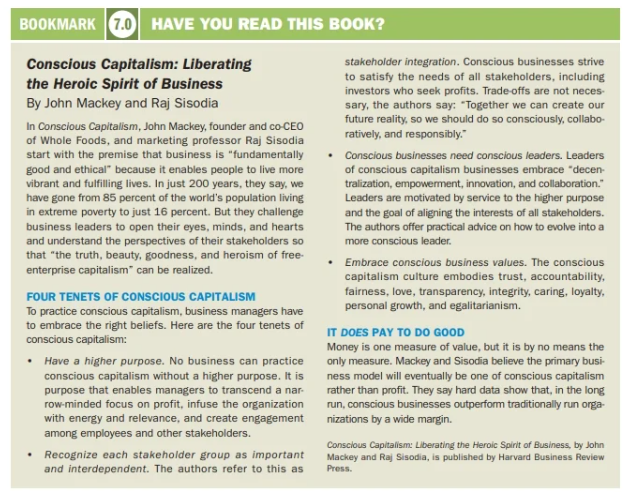Question
10. Explain the concept of conscious capitalism. Do you think managers and companies that espouse this kind of shared value approach are more likely to
10. Explain the concept of conscious capitalism. Do you think managers and companies that espouse this kind of shared value approach are more likely to behave in socially responsible ways?
7.2c Conscious Capitalism
Conscious capitalism, which has also been referred to as a shared value approach, refers to organizational policies and practices that both enhance the economic success of a company and advance the economic and social conditions of the communities in which the company operates.33 Hindustan Unilever, for example, uses a direct-to-home distribution system for its hygiene products in parts of India, whereby women from low-income households in villages of less than 2,000 people are given micro loans and training to start their own small businesses. The system benefits communities by giving women skills and opportunities that sometimes double their household income, as well as by reducing the spread of disease by bringing hygiene products into isolated areas. It also benefits the com-pany by extending its market and building its brand in hard-to-reach areas. The project now accounts for five percent of Hindustan Unilevers revenue in India.34 Conscious capitalism means having a higher purpose besides just making money by focusing on employees, customers, suppliers, and the community as well as on shareholders; seeking to bring out the best in people; and fostering trust and respect. Companies that embrace a conscious capitalism philosophy include Whole Foods Market, Costco, Pedigree, Medtronic, and Trader Joes. The BookMark further describes the philosophy of conscious capitalism

Step by Step Solution
There are 3 Steps involved in it
Step: 1

Get Instant Access to Expert-Tailored Solutions
See step-by-step solutions with expert insights and AI powered tools for academic success
Step: 2

Step: 3

Ace Your Homework with AI
Get the answers you need in no time with our AI-driven, step-by-step assistance
Get Started


